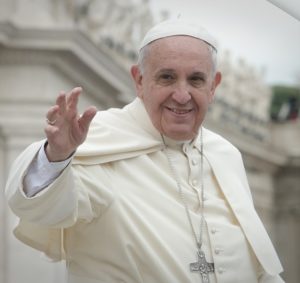Pope JPII Institute’s Family Values Shift – From Martinet to Listener
Pope Francis continues to move Catholicism from irrelevant to part of ordinary life. A large part of this change is his focus on family, emphasizing warm pastoral care over purity and sexual sins. The switch will help to stem the flow of people, especially young people, out of the Church. 
The latest change began with his September 8, 2017 Apostolic Letter, Summa Familiae Cura, where he modified the name of Pope John Paul II’s Institute on Marriage and Family and started the process of changing its statutes. The new name is the Pontifical John Paul II Theological Institute for Matrimonial and Family Sciences. 
Summa Familiae Cura has the flavor of Pope Francis’s two previous Apostolic Exhortations: Evangelii Gaudium (The Joy of the Gospel), published in 2013 and especially Amoris Laetitia (The Joy of Love), published in April 2016. It is obvious that Pope Francis intended the newly renamed institute to heavily incorporate Amoris Laetitia into its curriculum and culture. The Institute will also broaden its educational focus from theology to include “family sciences.” This passage on the first page of Summa Familiae Cura must have given conservatives a chill:
“Anthropological-cultural change, that today influences all aspects of life and requires an analytic and diversified approach, does not permit us to limit ourselves to practices in pastoral ministry and mission that reflect forms and models of the past. We must be informed and impassioned interpreters of the wisdom of the faith in a context which individuals are less well supported than in the past by social structures, and in their emotional and family life. With the clear purpose of remaining faithful to the teaching of Christ, we must therefore look, with the intellect of love and with wise realism, at the reality of the family today in all its complexity, with its lights and shadows.”
Several phrases leap out: The Church would no longer “limit ourselves to practices in pastoral ministry and mission that reflect forms and models of the past.” That statement opened the door to new ways of accompanying people through challenges in their lives. “With the clear purpose of remaining faithful to the teaching of Christ…” That sentence signals a dramatic philosophical shift in attitude from the usual clerical admonishment to adhere to the teaching of the Magisterium. 
The pope announced that he would broaden the Institute’s studies and coursework. While the graduate school’s curriculum had previously centered on the theology of marriage and the family, it will be changed to incorporate social sciences and other approaches to studying the family. The licentiate and doctoral programs have been retained, but there is no explicit reference in the new statutes to John Paul II, his Theology of the Body, or Humanae Vitae. New faculty will be added. Pope Francis appointed Archbishop Vincenzo Paglia as Grand Chancellor of the refounded JPII Institute. Archbishop Paglia is now firmly in charge of curriculum and hiring. The revamped Institute will promote the thought of Pope Francis, and open windows and doors to the lived experience of Catholic families–not an idealized one promoted by celibate clerics. 
The appointment of Archbishop Paglia must stick in the craw of a lot of conservative Catholics. Archbishop Paglia was the President of the Pontifical Council for the Family from 2012 to 2016 and Bishop of Teri-Narni-Amelia, Italy, from 2000 to 2012. He was the postulator for the cause of canonization of St. Oscar Romero (1917 – 1980), the assassinated Archbishop of San Salvador in El Salvador. Archbishop Paglia has raised conservative hackles before, especially with his massive mural of sinners on the façade of his cathedral church. It depicts Jesus carrying nets of sinners to heaven, including Bishop Paglia himself. Life Site News described the group in the nets as “homosexuals, transsexuals, prostitutes and drug dealers.” Jesus’ penis can be seen through his translucent garb. This is slightly scandalous, but no more so than the usual image of a crucified Jesus whose skimpy loincloth barely covers his thighs. That suggestive image has been a fixture in many Catholic churches for years. 
The release of Summa Familiae Cura came two days after the death of Cardinal Carlo Caffarra. Cardinal Caffarra was appointed president by Pope John Paul II when the Institute was founded in 1981. He was an influential mentor to the long-serving president and professor of moral theology, Monsignor Livio Melina. Msgr. Melina had taught at the Institute since 1986 and served as its president from 2006-2016.
Cardinal Caffarra was one of the four cardinals who signed the Dubia, a series of theological questions on Amoris Laetitia presented to Pope Francis in 2016. The document sought to force the pope to clarify any ambiguity regarding communion for divorced and remarried Catholics, among other issues. 
The Vatican’s PR machine cranked into action this summer as the Institute’s reorganization was completed and the fall semester drew close. In a press release issued on July 29, 2019 the Institute defended its changes in statues and faculty: “The academic project of the new Institute, approved by the Congregation for Catholic Education, is designed as a widening of reflection on the family, and not as a replacement of themes and topics. Such expansion, showing even more the centrality of the family in the church and in society, confirms and relaunches with new vigor the original and still fruitful intuition of St. John Paul II.”
The Vatican newspaper, L’Osservatore Romano ran an article explaining why the Institute needed to better understand families. Avvenire, Italy’s national Catholic newspaper, published an article on July 30, 2019 describing how people at the Institute had criticized the work of the two synods on the family and the post-synodal document, Amoris Laeititia. Without naming specific faculty, Luciano Moia, the author, said the attacks were especially inappropriate because they came from “the heart of an institute that should have represented the field of high-level, specialized formation, one of the drivers of renewal, not the organizer of an insurgent fraction.”
Two of the authors of that discontent were dumped from JPII’s faculty and administration: Monsignor Livio Melina, who held the Chair of Fundamental Moral Theology and Fr. Jose Noriego, who held the Chair of Specialized Moral Theology. Both were notified that their positions had been eliminated. Little wonder—Msgr. Melina insisted on interpreting the ideas contained in Amoris Laeititia in the light of Pope John Paul II’s encyclicals on family, Familiaris Consortio, and the Church’s moral teaching, Veritatis Splendor. As the gospel says, new wine in old wineskins doesn’t work.
Fr. Jose Granados, an official of the Institute, doggedly defended the old professor. “The way that you understand (the 1993 encyclical) Veritatis splendor will shape the way you view particular moral issues, such as the morality of contraception or sexual acts outside of marriage….Is it not that Melina…has remained faithful to Humanae vitae and Veritats splendor..?”
Hint: If you try to undermine the Pope it’s not healthy for your career in Catholic academia. What happened to Msgr. Melina sounds like what happened to Fr. Charles Curran and many other theologians, educators and religious during the Pope John Paul II/Pope Benedict era. There was no welcome mat for dissidents.
What horrified Fr. Granados the most was the prospect of welcoming Fr. Maurizio Chiodi to the faculty of the Institute. “Rumors now circulate that Professor Maurizio Chiodi will come to teach, who opens himself up to the lawfulness of contraception and accepts homosexual acts as ‘possible’ in some situations.” Fr. Chiodi is a professor of moral theology at the Northern University of Milan and a new member of the Pontifical Academy for Life. He has been described as a “disciple” of Cardinal Caffarra’s old adversary, German priest Bernard Haring. Fr. Haring was a Roman Catholic scholar who influenced the sweeping modernization of Vatican II by emphasizing a moral theology of Christian love rather than the cataloging of sins. He also advocated the virtue of listening. ”All of us dislike a fellow who always speaks to us and never listens,” Haring told Catholic University (DC) students in 1964. ”If the church doesn’t listen to the world, then the world will never listen to the church.”
